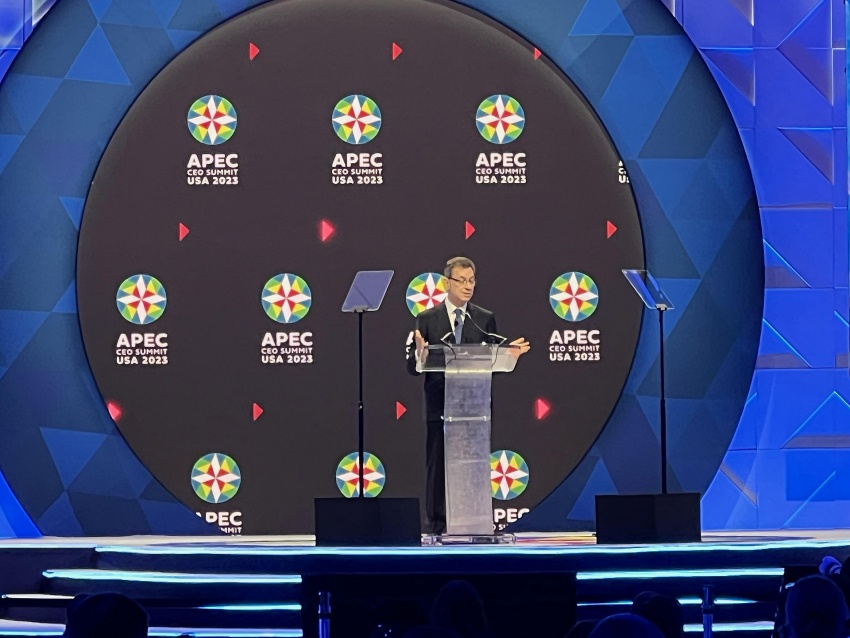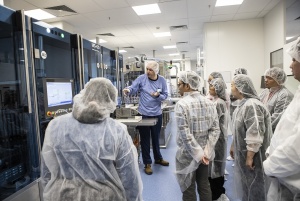An epidemic of exclusion that must be cured
It is clear that rarely have we seen a world with so many challenges at one time, and in so many places. Yet, for all their particulars and complexities, I believe they all have exclusion at their root. There are four types of exclusion that we can and must cure.
 |
First, we must cure the epidemic of economic exclusion. Wherever women, minority groups, the disabled, the poor, and the vulnerable do not have equal access to work, pay, and justice, economies and our society suffer.
To name just one example, according to a report from earlier this year, narrowing the pay gap could increase global economic activity by a breathtaking $7 trillion. That is higher than the GDP of all but the two richest countries on Earth. All it would take is for us as a global community to fully include women in our workplaces and our economies.
This is not just an economic crisis. This is a human tragedy. Think how many ideas and opportunities are left unrealised, and how many people are denied the chance to reach their full potential by this lack of inclusion.
Secondly, we must cure the epidemic of social exclusion. The poison of prejudice leaves all of us vulnerable.
For instance, since the onset of the pandemic, there has been an explosion of violence against Asians globally, in places as widespread as the United States, the United Kingdom, and New Zealand. It is infuriating and sad to have a virus politicised and a community scapegoated.
In my company’s home city of New York, there were 131 hate crimes targeting Asians in 2022 compared to 28 in 2020 and just one in 2019, according to police statistics. The increase has continued so far this year.
We are all diminished when Asian communities are scapegoated and attacked by the hateful ignorance that has festered under the pandemic. And this is just one example. The unacceptable degradation faced by Asian communities in the United States is felt by many other communities here and around the world.
Next, we must cure the epidemic of political exclusion. We all see the tragedy of oppression, dislocation, and xenophobia that has driven jaw-dropping numbers of refugees around the world from their homes and into the uncertain welcome of places with anti-immigrant anger.
We do not have to search hard to find examples where those attitudes have descended into unthinkable suffering.
Terrorism, persecution, religious conflict, and ethnic violence – our headlines are full of bloodshed from all over the world, and it can seem as though peace is falling further and further out of reach.
Finally, we must cure the epidemic of personal exclusion. This is perhaps the hardest to see, yet it may have the farthest-reaching consequences of all.
The US surgeon general Vivek Murthy recently issued a report titled Our Epidemic of Loneliness and Isolation. Its results were sobering. It revealed that young people aged 15-24 had 70 per cent less social interaction with their friends than two decades ago.
It warned that the physical consequences of poor connection can be devastating, including a 29 per cent increased risk of heart disease, a 32 per cent increased risk of strokes, and a 50 per cent increased risk of developing dementia for older adults.
The want of inclusion does not just harm our economies and our societies, we can see its effects in the human body itself.
Exclusion is the common denominator of all four of these epidemics, and inclusion is the cure we must reach for together. To be sure, these are daunting challenges. But as a deeply optimistic person, I want to make clear that we can do this. And by doing it, we won’t just solve problems, we will bring new benefits to the world.
Leaders of the business community all have a role and a responsibility to build more inclusive cultures within their companies, and more importantly still, to build a more inclusive society in the places we live and work.
A part of that is simply showing up. Showing that we are on our own learning journeys, just like everyone – and by joining forums like these. Inviting experts into our offices. Attending convenings of civil society. Listening to our own teams. Challenging them to think differently about inclusion and how it must shape our businesses.
Appearing in the right place can be so easy, yet so powerful.
We must also strive for a broader impact. We can do that in our corporate practices, by providing a level playing field where equity reigns, and where every single person is seen, heard, and cared for.
This begins in our workplaces themselves, which are the modern-day town commons, where people who otherwise might not meet can come together. To achieve the maximum impact, we must return to the office and see each other face-to-face. Teleconferencing is simply no substitute for the personal interaction that makes it possible to share ideas, build connections, or even agree to disagree. Business is uniquely positioned to provide space for these once-treasured principles, and we must act on that opportunity.
We can widen the aperture of inclusion by understanding that, yes, inclusion is about race, gender, and religion, but it is also about so much more. It means including different perspectives, methods, and ideas from different geographies, industries, and even class structures. For those of us in healthcare, it particularly means understanding and responding to our patients.
For companies on the cutting edge of technology, it means listening to the fears and concerns associated with the advancements we strive for. Rather than dismissing those who criticise us or worry about unintended consequences, we should strive to listen, understand, address, and hopefully resolve their concerns, seeking not to leave them behind but to bring them along with us. For all those of us who embrace and find joy in science and technology, there are equally many who feel excluded. It is our job to include them, not just in our words but in our research, our discoveries, and our strategic plans.
We must also build more inclusive ecosystems. When Pfizer thinks about partnerships, we look for organisations that can help us make the next life-saving drug or vaccine, but we also look to partner with organisations that will create the next underlying technology, the next curriculum, the next scientific breakthrough. This is why we have developed the Pfizer School of Science – to ensure we are fighting the typical exclusion of underserved communities from science-based careers.
We must be active corporate citizens beyond the four walls of our company headquarters, combating the underlying sources of division that may originate beyond the workplace, but that certainly impact our operations.
 | Pfizer seeks to boost presence in Vietnam A business mission led by Anil Argilla, president of Emerging Markets Asia at Pfizer, worked with Deputy Minister of Health Do Xuan Tuyen and the heads of other departments on May 25 to discuss business opportunities in Vietnam. |
 | Pfizer takes big steps with new vaccines Biopharmaceutical company Pfizer has announced that its two-in-one flu and COVID-19 jab will be moving into a final-stage trial in the coming months, along with the finalisation of the phase-three trials for its mRNA vaccine against influenza for adults. |
 | The game-changers in pharmaceuticals Innovative pharmaceuticals are emerging as a game-changer reshaping the industry, which is urging Vietnamese authorities to have supporting policies to tap into new potential. |
What the stars mean:
★ Poor ★ ★ Promising ★★★ Good ★★★★ Very good ★★★★★ Exceptional
Themes: Healthcare Platform
- Hanoi intensifies airport monitoring amid Nipah disease risks
- Cosmetics rules set for overhaul under draft decree
- Policy obstacles being addressed in drug licensing and renewal
- Sanofi, Long Chau Pharmacy relaunch medicine blister pack collection initiative
- Takeda Vietnam awarded for ongoing support of Vietnam’s sustainability efforts
Related Contents
Latest News
More News
- Russian President congratulates Vietnamese Party leader during phone talks (January 25, 2026 | 09:58)
- Worldwide congratulations underscore confidence in Vietnam’s 14th Party Congress (January 23, 2026 | 09:02)
- Political parties, organisations, int’l friends send congratulations to 14th National Party Congress (January 22, 2026 | 09:33)
- 14th National Party Congress: Japanese media highlight Vietnam’s growth targets (January 21, 2026 | 09:46)
- 14th National Party Congress: Driving force for Vietnam to continue renewal, innovation, breakthroughs (January 21, 2026 | 09:42)
- Vietnam remains spiritual support for progressive forces: Colombian party leader (January 21, 2026 | 08:00)
- Int'l media provides large coverage of 14th National Party Congress's first working day (January 20, 2026 | 09:09)
- Vietnamese firms win top honours at ASEAN Digital Awards (January 16, 2026 | 16:45)
- ASEAN Digital Ministers' Meeting opens in Hanoi (January 15, 2026 | 15:33)
- ASEAN economies move up the global chip value chain (December 09, 2025 | 13:32)

 Tag:
Tag:
























 Mobile Version
Mobile Version